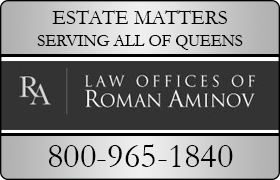Jamaica Real Estate Lawyer, New York, page 6
Sponsored Law Firm
-
 x
x

Click For More Info:
-
The Law Offices of Roman Aminov
147-17 Union Turnpike Flushing, NY 11367 » view mapElder Law, Probate, Estate Planning Free Inital Phone Consultation
The Law Offices of Roman Aminov is a client centric trusts and estates practice concentrating in estate planning, elder law, and probate.
800-965-1840  Roman Aminov
Flushing, NY
Roman Aminov
Flushing, NY Attorney At Law - New York, 2011
 Testimonials
Testimonials"Roman went out his way to help me. He made several attempts to contact me."
 Contact UsEmail or Call 24/7
Contact UsEmail or Call 24/7Call for free initial consultation,
800-965-1840.
Joseph P. Asselta
Construction
Status: In Good Standing *Status is reviewed annually. For latest information visit here
Mark S. Borten
Real Estate
Status: In Good Standing *Status is reviewed annually. For latest information visit here
Leonard W. Wagman
Litigation, Other, Real Estate, Business
Status: In Good Standing *Status is reviewed annually. For latest information visit here
James L. Iannone
Real Estate, Litigation, Estate Planning, Criminal
Status: In Good Standing *Status is reviewed annually. For latest information visit here
Brian D. Porch
Antitrust, Corporate, Litigation, Real Estate, Industry Specialties
Status: In Good Standing *Status is reviewed annually. For latest information visit here
FREE CONSULTATION
CONTACTRonald S. Herzog
Real Estate, Business
Status: In Good Standing *Status is reviewed annually. For latest information visit here
Kate Sinding
Land Use & Zoning, Household Mold, Environmental Law
Status: In Good Standing *Status is reviewed annually. For latest information visit here
Paul B Gottbetter
Real Estate, Estate Planning, Partnerships, Business Organization
Status: In Good Standing *Status is reviewed annually. For latest information visit here
FREE CONSULTATION
CONTACTJacob M. Dyckman
Real Estate, Trusts, Estate Planning, Business Organization
Status: In Good Standing *Status is reviewed annually. For latest information visit here
FREE CONSULTATION
CONTACTChristine A. Brennan
Pharmaceutical Product, Medical Malpractice, Professional Malpractice, Premises Liability
Status: In Good Standing *Status is reviewed annually. For latest information visit here
FREE CONSULTATION
CONTACT

 Testimonials
Testimonials Contact UsEmail or Call 24/7
Contact UsEmail or Call 24/7